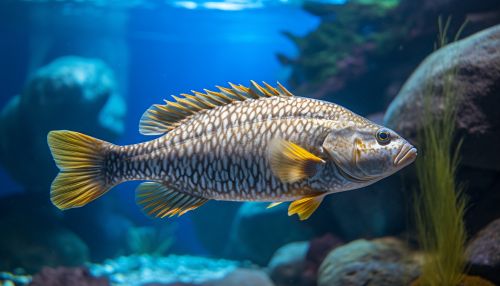Endocrinology of fish
Introduction
Endocrinology, the study of the body's hormone-secreting glands, is a complex field that extends to all forms of life, including fish. In fish, the endocrine system plays a pivotal role in a variety of biological processes such as growth, reproduction, and metabolism. This article delves into the intricate world of fish endocrinology, exploring the various glands, hormones, and their functions in these aquatic creatures.
Endocrine Glands in Fish
Fish possess several endocrine glands that are responsible for the production and secretion of hormones. These include the pituitary, thyroid, interrenal, and ultimobranchial glands, among others.


Pituitary Gland
The pituitary gland, also known as the hypophysis, is a small gland located at the base of the brain. It is often considered the 'master gland' as it controls the function of most other endocrine glands. In fish, the pituitary gland secretes several hormones including growth hormone (GH), prolactin (PRL), and gonadotropins (GtHs), among others.
Thyroid Gland
The thyroid gland in fish is responsible for the production of thyroid hormones, namely thyroxine (T4) and triiodothyronine (T3). These hormones play a crucial role in regulating metabolic processes and influencing growth and development.
Interrenal Gland
The interrenal gland in fish, analogous to the adrenal cortex in mammals, is responsible for the production of corticosteroids. These hormones are involved in a variety of physiological processes including stress response, immune function, and electrolyte balance.
Ultimobranchial Gland
The ultimobranchial gland in fish is responsible for the production of calcitonin, a hormone that plays a key role in calcium homeostasis.
Hormonal Regulation in Fish
Fish endocrinology is characterized by a complex network of hormonal regulation. The hypothalamic-pituitary axis, a central component of this network, orchestrates the production and release of various hormones, thereby regulating a multitude of physiological processes.
Growth Regulation
Growth in fish is primarily regulated by the growth hormone (GH) secreted by the pituitary gland. This hormone stimulates the production of insulin-like growth factors (IGFs) in the liver and other tissues, which in turn promote cell proliferation and growth.
Reproductive Regulation
Reproduction in fish is controlled by the gonadotropins (GtHs), namely follicle-stimulating hormone (FSH) and luteinizing hormone (LH). These hormones regulate the development and function of the gonads, and the production of sex steroids.
Metabolic Regulation
The thyroid hormones (T3 and T4) play a crucial role in regulating the metabolic rate in fish. These hormones influence processes such as protein synthesis, carbohydrate metabolism, and lipid metabolism.
Stress Response
The interrenal gland plays a key role in the stress response in fish. In response to stress, this gland produces corticosteroids, which help the fish to cope with the stressful situation by altering its metabolic rate and immune function.
Conclusion
The field of fish endocrinology is a complex and fascinating area of study, offering insights into the intricate hormonal regulation that governs the life of these aquatic creatures. Understanding these processes not only enriches our knowledge of fish biology but also has potential applications in areas such as aquaculture and environmental monitoring.
